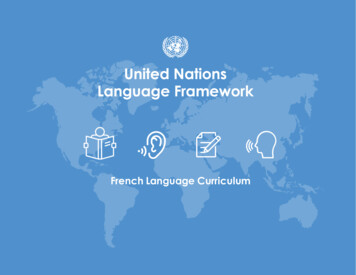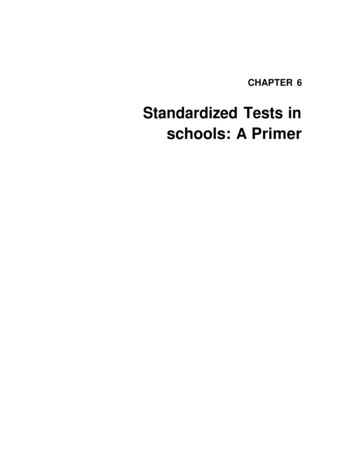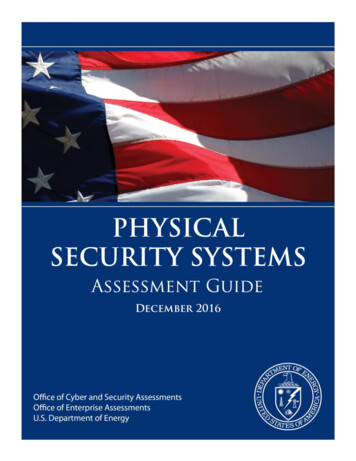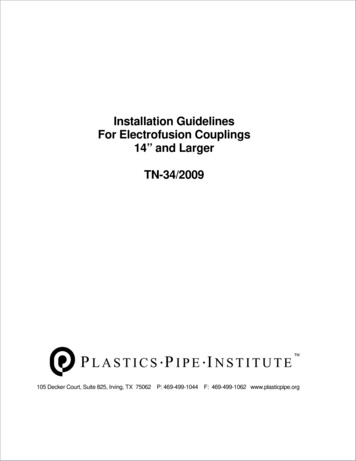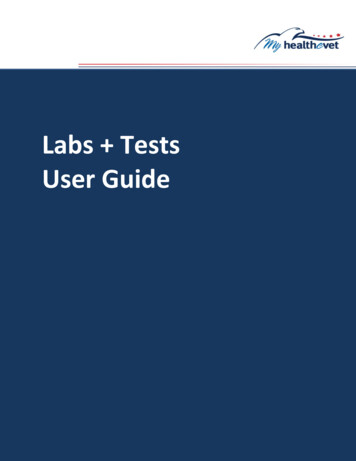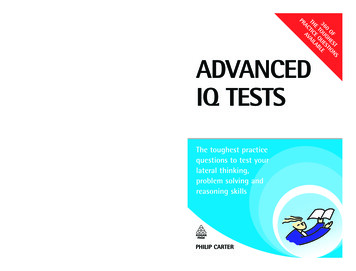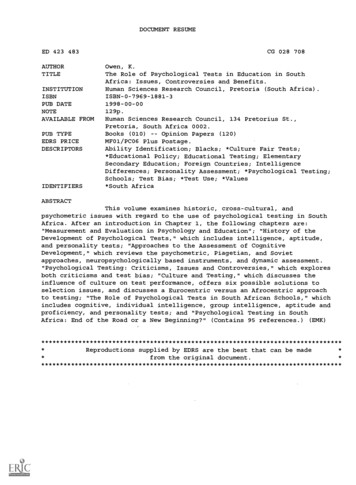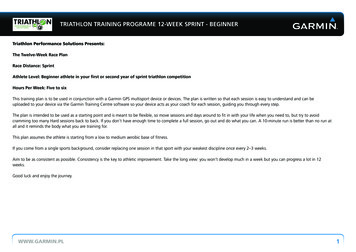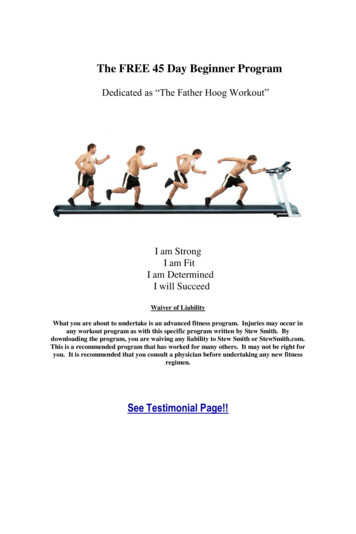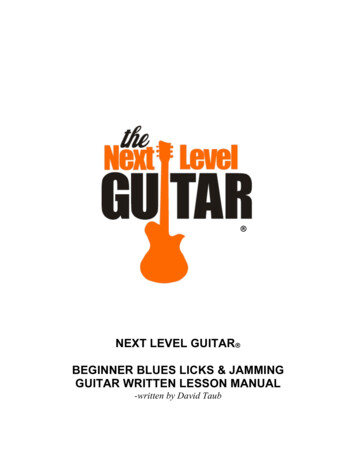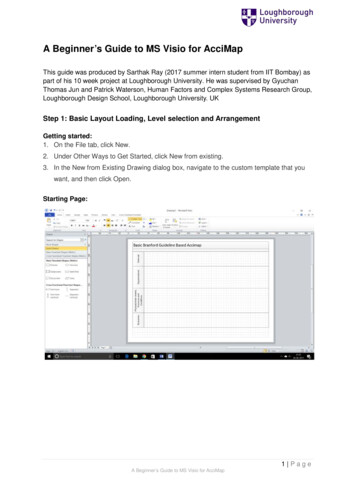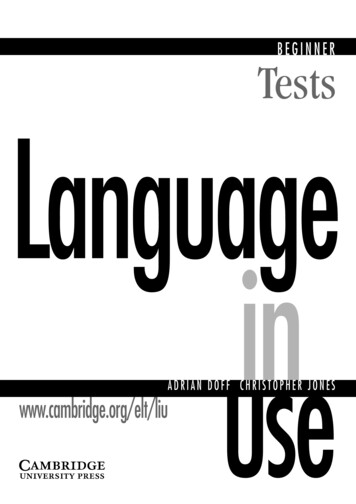
Transcription
BEGINNERTestsLanguageinuseADRIAN DOFF CHRISTOPHER JONESwww.cambridge.org/elt/liu
ContentsIntroductionpage 1Progress test 12Progress test 26Progress test 310Progress test 414Summary test (written)18Speaking test 122Speaking test 223Speaking test 324Speaking test 425Summary test (speaking)26Answer key27Marking guide: Written tests section H28Marking guide: Speaking tests29
IntroductionThis booklet contains four Progress tests and one Summary test for the Language in Use Beginner course.Each of the Progress tests covers six units in the Classroom Book. The Summary test is for use at the end ofthe course, and makes use of material from all units. All five tests have the same format. There is an Answerkey and Marking guide on pages 30–31.Each test has two components: a written paper, covering grammar, vocabulary, reading and writing. an (optional) oral test, in which pairs of students speak to the examiner and to each other.While the main aim is to help learners measure their progress as they go through Language in Use, bothwritten and oral tests also give practice in techniques needed for public examinations such as the CambridgeKey English Test (KET).The written componentThis has eight sections. 70 marks are available.Section A: Sentences(10 marks)There are ten multiple choice gapped sentences (each with three options). The questions cover a range ofgrammar and vocabulary.Section B: Words(5 marks)This is a matching task on a lexical group. Learners choose five answers from seven options.Section C: Replies(5 marks)There are five multiple choice questions (each with three options). Learners have to complete five separatetwo-line exchanges.Section D: Conversation(6 marks)This is a matching task based on a short conversation. Learners choose six answers from eight options.Section E: Gapped text(7 marks)This is a three-option multiple choice cloze task. There are seven questions.Section F: Reading(8 marks)This is a reading comprehension task with eight multiple choice questions (each with three options).Section G: Cloze(11 marks)This is an open cloze task. Learners have to fill each gap with one suitable word. There are 11 gaps.Section H: Writing(18 marks)Three writing tasks. Students write short paragraphs (two or three sentences long) on a variety of topics.Some of the content is usually specified. There are six marks for each paragraph.Note: The test takes 70 minutes. If this is longer than you have available, it can be given in two parts: Sections A–F, on the first three pages (the more receptive part of the test): 45 minutes. Sections G–H, on the final page (the more productive part of the test): 25 minutes.The oral componentThis component is optional. Two students take the test at a time together with an examiner. The test has twosections, and takes around 7–8 minutes. 20 marks are available.Section A: Examiner–Student(10 marks)In this section, the examiner asks the two students questions in turn. Each student has to:– answer vocabulary questions, and spell one or two words.– answer one or two questions on a topic concerning their own lives.– talk briefly about a topic given by the examiner (three or four sentences).Section B: Student–Student(10 marks)In this section, the students talk to each other, using prompt cards. There are two kinds of activity:eitherA asks B questions about him- or herself. B answers the questions.orA asks B questions about e.g. a shop, a party. B answers using information on the prompt card.Two sets of prompt cards are used during each test, giving both students an opportunity to ask questions andanswer them.1
Progress test 1: Units 1–6Time allowed: 70 minutes.Answer all the questions.Write your answers on this paper.SectionPlease do not write in this box.ABCDEFGHTotalScoreNAME:Section A(10 marks)Choose the best answer, A, B or C. The first one is an example.0. is your name?B WhoC WhatC. old are you?A HowB WhoC What.Where . ?A you fromB you are fromC are you from.A How123456789My flat only has two rooms – it’s very . .A smallB bigC large.There aren’t . windows in this room.A aB anyC some.Who’s . man over there? Is he a policeman?A thisB thatC those.How many students . in your class?A there isB there areC are there.There are lots of . here.A touristB tourists.C tourist’sMy jackets are in the . in my bedroom.A cupboardB fridgeC cooker.It’s my mother’s birthday today. She’s . .A fourteenB fourthC forty.10 . is my favourite city.A EnglandB EnglishC LondonSection B.(5 marks)Look at the picture and imagine the colours. Choose the best colours (A–H) to complete each sentence.The first one is an example.A blackskysuntreesgrass2cloudzebra0D .The cloud is .1The sun is . .2BblueCgreenDgreyThe sky is . .Epink3The grass and trees are . .Fred4The zebra is . and . .GwhiteH yellowPHOTOCOPIABLE Cambridge University Press 2000Test 1: Units 1–6
Section C(5 marks)Complete the five conversations.Choose A, B or C.A I’m 18.B I’m Peter.C I’m fine.EXAMPLEHow are you?1Is this your umbrella?.2Can I have some juice, please?.3Tom – this is my friend Lisa.4Here’s a present for you – happy birthday!.5What’s your address?.ANSWER: CABCYes, they are.That’s true.No, it isn’t.ABCYes, of course.Thank you.Oh, really?ABCWhat’s her name?I don’t know.Hi. How are you?ABCPlease.Thank you.That’s all right.ABC402 1071.5, Market Street.Mr and Mrs Brown.Section D(6 marks)Complete this conversation at a party. What does Mike say to Jill?Choose the correct letter A–I from the box. The first one has been done for you.Jill:Hello. Who are you?Mike: 0C.Jill:And I’m Jill. Where are you from, Mike?Mike: 1.Jill:AI’m from London.BAre you Dolores Mitchell?Me too. And are you married?COh, hi. I’m Mike.Mike: 2.DNo, she’s here, actually – that’s her, over there.Jill:Do you have any children?Mike: 3.EYes, we have two – a girl and a boy.Jill:Really? How old are they?FYes. Yes, I am.Mike: 4.GOh, sorry.Jill:And where’s your wife now? At homewith the children?H That’s right. And I’m Mike Mitchell.Mike: 5.IJill:But that’s Dolores Mitchell!Mike: 6.Jill:Oh! So you’re married to Dolores Mitchell Test 1: Units 1–6The girl’s three, and the boy is just a baby.PHOTOCOPIABLE Cambridge University Press 20003
Section E(7 marks)Read the text, and choose the best words to fill the gaps. The first one has been done for you.0A isn’tB aren’tC am not1A womanB womansC womenhave three daughters – me (my name’s Jenny), and2A motherB fatherC parentsmy two .3. Barbara and Jo. Barbara3A brothersB sistersC parents4A husbandB husbandsC husband’s5A childrenB babiesC sons.6. girl. She’s just one year old, and6A childB babyC son.7. name’s Anna.7A hisB herC itsThere .0. many men in my family, butthere are lots of .1. . My .2.and Jo aren’t married, but I am. My .4.name is Bob. We have five .5. – andthey’re all girls! And my oldest daughter Liz has aSection F(8 marks)Read the information about three hotels, and answer the questions. Which hotel are the people staying at? Write Plaza,Park or Roxy. The first question has been done for you.THE PLAZA HOTELTHE PARK HOTELTHE ROXY HOTELThe Plaza Hotel is right on thebeach. All rooms have theirown bathroom, phone and TV.They also have a large bed, asofa and two armchairs, and alarge balcony. There are 60rooms on five floors, and fourlifts. The hotel has threerestaurants and twoswimming pools.The Park Hotel is in the citycentre. It has 25 rooms on fourfloors. There isn’t a lift. Therooms are small, but they havebig windows, and there is adesk and chair, and a radio.There are two bathrooms onevery floor, and there’s a TVroom next to the restaurant, onthe ground floor.The Roxy Hotel is near theairport, about 10 km from thecity. It has 120 rooms on sevenfloors, and six lifts. There’s arestaurant and a swimmingpool. The rooms aren’t verylarge, but all have bathrooms,and some rooms have smallbalconies. There is a phone,TV and radio in every room.0‘There isn’t a lift in our hotel.’Park.1‘We have a balcony, but it isn’t very big.’.2‘Our room has a TV, but not a radio.’.3‘The hotel’s near all the big shops.’.4‘The restaurants in our hotel are very good.’.5‘The rooms are very large.’.6‘Our room is on the sixth floor.’.7‘There isn’t a toilet or a shower in our room.’.8‘The hotel’s by the sea.’.4PHOTOCOPIABLE Cambridge University Press 2000Test 1: Units 1–6
Section G(11 marks)Look at the picture and completethe sentences. Write ONE word ineach gap. The first one has beendone for you.0on.1.2.3.4.5.6.7.8.9.on the little table .6. the bed. There’s a box on the .7. ,10.and there are some books .8. the box. There’s a radio on the11.9. . There’s a computer and a .10. on the .11. .There’s a cat .0. the bed, and there are some shoes .1.the bed. There’s a big picture on the .2. . In the picture, there aresome .3. , some trees and a .4. . There’s a .5.Section H1(18 marks)Write two or three sentences about a friend. Use the ideas in the box to help you.name?.age?.hair? eyes?.address?2Read this email from a friend. Write a short reply. Answer his questions.Hi!I’m in your flat. It’s very nice! Ihave two questions:- Is there a radio? Where?- Where are the coffee and thesugar?Thanks, George3Dear George,.Write two or three sentences about the school where you are now. Use the ideas in the box to help you.How many students?teachers? classrooms?.TVs? videos? computers?.library? café?.Test 1: Units 1–6PHOTOCOPIABLE Cambridge University Press 20005
Progress test 2: Units 7–12Time allowed: 70 minutes.Answer all the questions.Write your answers on this paper.SectionPlease do not write in this box.ABCDEFGHTotalScoreNAME:Section A(10 marks)Choose the best answer, A, B or C. The first one is an example.0She’s reading . in the living room.A a video123456789B some musicC.C a magazineMy brother’s . . He works in a small French restaurant.A a waiterB a shop assistantC a secretary.Please . the piano now. The children are asleep.A don’t playB no playC not to play.Our car isn’t fast. It’s very . .A weakB short.C slowMy mother likes Mel Gibson, but she . Arnold Schwarzenegger.A likesB don’t likeC doesn’t like.We usually watch a football match . Saturday afternoon.A inB onC at.The programme starts at ten . .A o’clockB clocksC hours.Where . ?A do you workB you do work.C you workThat’s her over there – . a green dress and a hat.A she wearsB she’s wearingC she wearing.People usually eat soup with . .A a knifeB a forkC a spoon.10 The school is in River Street, next . the supermarket.A byB toC atSection B.(5 marks)Read the sentences about shops. What is the best word (A–H) for each sentence? The first one is an example.0You can buy aspirins and shampoo here.D.AbankBbaker1You can buy shorts and trousers here.Cbutcher2You can buy meat here.Dchemist3You can buy fruit and vegetables here.Eclothes shop4You can send a parcel here.FgreengrocerGnewsagent5You can buy bread here.6PHOTOCOPIABLE Cambridge University Press 2000H post officeTest 2: Units 7–12
Section C(5 marks)Complete the five conversations.Choose A, B or C.A I’m 18.B I’m Peter.C I’m fine.EXAMPLEHow are you?1Excuse me – how much are these T-shirts?.2What are you studying?.3Hello. Can I speak to George, please?.4Hurry up! I want to go!.5What time do you have lunch?.ANSWER: CABCSize 38. 25.Green and red.ABCI’m a student.Yes, I am.English and French.ABCNever mind.Yes. Just a moment.Hello – 31249.ABCOK. Wait a minute.OK. Come in.OK. Sit down.ABCAt twelve thirty.In a café, usually.Chicken and chips.Section D(6 marks)Complete this phone conversation. What does Jane say to Tom?Choose the correct letter A–I from the box. The first one has been done for you.Tom:Hello. 73481.Jane:0Tom:Oh, hi, Jane. Where are you?Jane:1Tom:E.AOh, come on – it’s Friday night!BIt’s right in the centre. Opposite the station.Great. What are you having?CAre you going out?Jane:2DWould you like to come? There’s lots of food.Tom:Mm. Great. Have a good time.EHi, Tom. This is Jane.Jane:3Tom:I’d love to, Jane, but I’m working.F114 North Street. It’s on the second floor.Jane:4GPasta with salad. And chocolate cake.Tom:OK – I’ll come! What’s the address?Jane:5Tom:Where’s that?Jane:6Tom:OK. See you in ten minutes. Goodbye!.H I’m washing my hair.IAt Sam’s flat. We’re cooking a meal.Test 2: Units 7–12PHOTOCOPIABLE Cambridge University Press 20007
Section E(7 marks)Read the text, and choose the best words to fill the gaps. The first one has been done for you.0A ageB oldC on1A haveB hasC havinghair. Jim lives .2. London. He’s2A inB onC at.3. engineer, and he works3A aB anC the4A forB fromC bymusic. He sometimes drinks wine, but he5A playB playsC playing.6. smoke. Jim drives an old Mini,6A noB don’tC doesn’tbut he wants to .7. a new BMW.7A sellB buyC shopJim Black is 22 years .0. . He’squite tall, and he .1. short black.4. British Telecom. In his freetime, he .5. tennis and listens toSection F(8 marks)Read about Amy, Bill and Cora, and answer the questions. Write one name for each answer.The first one has been done for you.AMY, age 19BILL, age 22CORA, age 24I like classical music and jazz, butI don’t like pop music. I play thepiano.I like pop music, especially fromthe 60s and 70s. I play the guitar,but not very well.I don’t know much about music,but I listen to pop music on theradio, and I quite like jazz.I cook all my own food. I eat a lotof rice and vegetables and freshfruit. I like fish, and I sometimeseat eggs.I love burgers, sausages, chips,things like that. I don’t eat a lot offruit or vegetables – that’s bad, Iknow!I don’t eat much meat, though Iquite like chicken. My favouritemeals are pasta and pizza. I eatquite a lot of fruit.I drink a lot of tea and mineralwater. I usually have a glass ofwine with my dinner.I drink coffee all day, but I don’tlike beer or wine. If I go to aparty, I drink orange juice.I drink a lot of fizzy drinks –Coke, lemonade, things like that.If it’s hot, I like to have a beer.I’m a student – I usually wearjeans and a T-shirt to classes. Ihate skirts!I work in an office, so I wear asuit and tie, but in the evening Ichange into jeans and a jumper.I’m a teacher. I usually wear adress to work, or a skirt andblouse – but never jeans!0Who doesn’t listen to pop music?Amy.1Who doesn’t play a musical instrument?.2Who never buys fast food?.3Who doesn’t often eat apples or bananas?.4Who doesn’t eat meat?.5Who doesn’t drink alcohol?.6Who doesn’t like hot drinks?.7Who often wears a skirt?.8Who doesn’t have a job?.8PHOTOCOPIABLE Cambridge University Press 2000Test 2: Units 7–12
Section G(11 marks)Complete this text about someone’s daily routine. Write ONE word for each space.The first one has been done for you.0up.From Monday to Saturday, I usually get .0. at 7.30.1.I .1. a shower, get dressed and eat my breakfast.2.Then I .2. the house at about 8.15, and go to work.3.I get to the office at 8.45 and I .3. work at nine4.o’clock. I have a very short lunchbreak, so I usually just have5.4. sandwich and a cup of coffee. I .5.6.7.8.9.10.11.work at 6.00, and I get home at about a quarter .6.six. After dinner, I usually .7. the TV, and I go to.8. at 11.00.But today’s .9., so I’m not at work. It’s 10.45in the morning. I’m listening .10. the radio – andI’m .11. breakfast in bed.Section H1(18 marks)Describe these two people. What do they look like? What are theywearing?.2Think about three people you know. Where are they now?What do you think they’re doing? Write a sentence about each one.3Write two or three sentences about a shop in your town.Use the questions to help you.Where is it?What does it sell?Is it open every day?What time does itopen and close?.Test 2: Units 7–12PHOTOCOPIABLE Cambridge University Press 20009
Progress test 3: Units 13–18Time allowed: 70 minutes.Answer all the questions.Write your answers on this paper.SectionAPlease do not write in this box.BCDEFGHTotalScoreNAME:Section A(10 marks)Choose the best answer, A, B or C. The first one is an example.0My brother’s . – he’s quite short, actually.C quite tallA.They’re rich – they . lots of money!A gotB has gotC have got.How much . do you want?A breadB apples.A not very tall123456789B very tallC eggsThere are lots of lemons, but there isn’t . sugar.A someB anyC a.We didn’t win the game – we . .A loseB losedC lost.He woke up late, so he . any breakfast.A didn’t hasB didn’t hadC didn’t have.My parents gave . a bike for my birthday.A meB to meC for me. about a hundred people at the party.A It wasB There wasC There were.Where . at the weekend?A you wentB did you go.C did you wentBudapest is . the River Danube.A inB onC at.10 She can play the piano, but she . swim.A can’tB ca’ntC cant.Section B(5 marks)What are these sentences about? Choose the best word (A–H) for each sentence. The first one is an example.0You buy things with this.F.AbreadBenvelope1You can open a door with this.Cflour2You put a letter in this.Dkey3You make sandwiches from this.Ematch4You wash your hair with this.FmoneyGshampoo5You can light a fire with this.10PHOTOCOPIABLE Cambridge University Press 2000H stampTest 3: Units 13–18
Section C(5 marks)Complete the five conversations.Choose A, B or C.A I’m 18.B I’m Peter.C I’m fine.EXAMPLEHow are you?1What’s the capital of Nigeria?.2What’s the weather like today?.3It’s really hot today!.4Let’s go for a swim.5Are you going home now?.ANSWER: CABCSure.I’m sure.I’m not sure.ABCSun and wind.The sun and the wind.Sunny and windy.ABCWould you like a drink?Could you like a drink?Do you like a drink?ABCNo, you can’t.Yes, you can.That’s a good idea.ABCNo, I’m not.No, I don’t.No, I didn’t.Section D(6 marks)Complete this conversation about a holiday. What does John say to Ann?Choose the correct letter A–I from the box. The first one has been done for you.Ann:Hi, John. How are you?John: 0Ann:I’m fine. Did you have a good holiday?John: 1Ann:Ann:Ann:.Lovely. But it sounds very expensive!John: 6We drove, actually. It was quite a long journey!BFine. A bit cloudy, but warm – and it didn’t rain!CVery well, thanks. And you?DNo, we stayed in a hotel.EIn the south of France. It’s near Cannes.FActually, it was free! We were in my parents’ villa.GIt’s usually very hot in summer.Did you go swimming?John: 5Ann:.And what was the weather like?John: 4A.Great. How did you go? By plane?John: 3Ann:.Oh, where’s that?John: 2Ann:C.H Not in the sea – it was quite cold. But we had apool in the garden, so we swam in that.I.Yes, it was great. We went to St Raphaël.Mm. Can I come next time?Test 3: Units 13–18PHOTOCOPIABLE Cambridge University Press 200011
Section E(7 marks)Read the text, and choose the best words to fill the gaps. The first one has been done for you.0A countryB cityC village1A northB westC southSicily. About four hundred2A hundredB thousandC million.2. people live in Malta.3A languagesB countriesC islands4A ItalyB ItalianC ItalicValletta is on the east .5. . Malta is .6.5A coastB beachC seaand dry in the summer, and the winters are also quite warm.6A hotB coldC wetA large number of tourists .7. Malta every year.7A goB visitC stayMalta is a small .0. in theSICILYMALTAMediterranean. It is .1. ofThe country has two .3. , Maltese and English, butmany people also speak .4. . The capital citySection F(8 marks)Three people say what they did last Sunday. Read the texts, and answer the questions. Write ONE name for eachanswer. The first one has been done for you.ANDYBELLACARLI got up at about 11.00, I think. Ihad breakfast, and started to cooklunch for the family. We hadchicken, with rice and salad.I’ve got a shop by the river, andwe’re open on Sundays, so I gotup at about 8.00, had a quick cupof coffee, made a sandwich forlunch, and walked to the shop.I got up at about 8.00, walked tothe newsagent’s and got a paper.Then I had a few cups of coffee,and read the paper in the garden.It was a lovely day, so after lunch,we all cycled along the river. Webought some ice-creams andswam, and on the way home, westopped at a Pizzeria for dinner.In the evening, I did a bit of workaround the house. Then I hadsome chocolate cake, and went tobed with a good book. I wasasleep by 10.00.The shop was busy. It was a hotday, and lots of people wantedice-creams, so I made quite a lotof money! We closed at 6.00.At lunchtime, I met some friendsat the pub, and we had a fewbeers. It was a really hot day, sowhen I got back home I sat in thegarden again and went to sleep.In the evening, my husband and Ihad some pasta and salad. Thenwe put our feet up, had a glass ofwine and watched TV. I went tobed at about 11.30.It was a lovely evening, so mygirlfriend came round and made asandwich and some freshlemonade. Then we watched TVuntil about 12.00.0Which person drank a lot?Carl.1Which person ate a lot?.2Which person went to work?.3Which person went on a bike?.4Which person didn’t buy anything?.5Which person didn’t read anything?.6Which person lives alone?.7Which person woke up late?.8Which person didn’t do much?.12PHOTOCOPIABLE Cambridge University Press 2000Test 3: Units 13–18
Section G(11 marks)Look at the map and completethe directions. Write ONE wordin each gap. The first one hasbeen done for you.RIVERSTREET1160to.1.2.the directions3.0. my flat.4.You get off the5.6.7.8.Street and go .5. the bridge. There’s a supermarket on the9.6. . Turn left, and walk .7. the river for 200 metres.10.Go .8. the Post Office, and .9. the steps at the end11.Pam –here areBRIDGE END.1. atBridge End Station.Come .2.of the station, and turn .3. . Then turn .4. into River.10. the street. I live at number 116, on the third .11. .Section H1(18 marks)Write two or three sentences about a good place for a holiday in your country.Use the questions to help you.Where is it?.What is it like?.What’s the weather like?.What can you do there?.2Write about three important dates in your family (or in your country).What are the dates and why are they important?.
Key English Test (KET). The written component This has eight sections. 70 marks are available. Section A: Sentences (10 marks) There are ten multiple choice gapped sentences (each with three options). The questions cover a range of grammar and vocabulary. Section B: Wo
